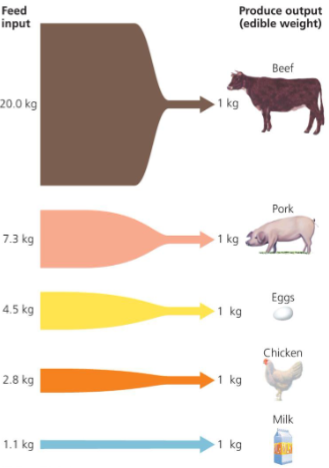Water land ecology test 2 study set
1/40
There's no tags or description
Looks like no tags are added yet.
Name | Mastery | Learn | Test | Matching | Spaced | Call with Kai |
|---|
No analytics yet
Send a link to your students to track their progress
41 Terms
Recall that areas with high net primary productivity not only take up large amounts of CO2 and give off large amounts of oxygen, but also produce high levels of biomass rapidly that eventually die off. What is the likely result of the increasing amounts of fertilizers in the major rivers emptying into oceans?
Eutrophication, followed by hypoxia, is a likely result, ultimately leading to less CO2 uptake and less oxygen released.
In an aquatic ecosystem experiencing eutrophication, levels of dissolved macronutrients ________ and dissolved oxygen levels ________.
increase; decease
The precipitation that flows over land and enters waterways is ________.
runoff
________ is any network of relationships among a group of components that interact with and influence one another through the exchange of energy, matter, or information.
system
A system stabilized by negative feedback, with opposing processes offsetting each other, is said to be in ________.
dynamic equilibrium
In some areas, cattle on an open range may compact fragile soils while grazing. This can damage plant roots, leading to fewer, smaller plants, which may in turn cause cattle to graze more and work harder to obtain food. This is an example of a ________.
positive feedback loop
The biosphere is best defined as ________.
all Earth's organisms and the nonliving environment with which they interact
Negative feedback processes tend to function within ecosystems to ________.
stabilize the ecosystem
All of the following are considered Earth's structural spheres except the ________.
atmosphere
Nitrogen and phosphorus are referred to as macronutrients because ________.
they are required in large amounts for organisms to survive
Ecotones are the ________.
transitional zones between ecosystems
When a reservoir accepts more material than it releases, this is known as a(n) ________.
sink
Which statement best describes the relationship between temperature and productivity of terrestrial biomes?
Warmer biomes tend to have higher productivity than colder biomes, given sufficient moisture.
Which of the following describes matter and energy flow in an ecosystem?
Energy flows through an ecosystem, whereas matter is recycled within an ecosystem.
The largest pool of carbon in the carbon cycle is ________.
the ocean
The atmosphere is an important reservoir (pool) in all the following cycles except ________.
phosphorus
All of the following are fluxes in the hydrologic cycle except ________.
fixation
The majority of Earth's fresh water exists ________.
in the form of ice
The first essential step in changing atmospheric nitrogen into more usable NH3 is called ________.
nitrogen fixation
Which of the following factos drives TFR down?
Social and economic security
Zero population growth occurs in a population when
Birth rate equals death rate and there is no migration
According to the IPAT model, which of the following would most likely reduce the environmental impact of a society?
Greater use of birth control by most members of society
A population that is neither growing nor declining will have a TFR of
2.1
Demographic transition
the decline in death rates and subsequent decline in birth rates that occur as a country economically develops
Humus
the organic soil component that holds soil moisture and enhances soil fertility
Traditional agriculture
refers to the agricultural practices in which the members of a farming family do not make use of large-scale irrigation, chemical fertilizer, machinery, or technology.
Leaching
Removes water-soluble nutrients from topsoil
The horizon where leached minerals and organic matter accumulate is called the
B horizon
Compaction of soil in a garden harms plants by
decreasing aeration, decreasing infiltration, and increasing runoff
Desertification
the loss of more than 10% of soil productivity in arid areas due to such factors as erosion, soil compaction, overgrazing, and forest removal
Shelterbelts are to ________ as terraces are to ________.
wind erosion; water erosion
Salinization
the buildup of salts in soils, often as a result of overirrigation.
Contour farming
is a method of reducing soil erosion by plowing furrows sideways across a hill that follows the natural shape of the land.
Erosion can result in a positive feedback loop because
plants are less likely to grow in eroded soil
The sequence for creating a Genetically modified organism
plasmid is isolated from a strain of bacteria.
The gene of interest is isolated from the cell of an organism
The gene of interest is inserted into a plasmid
The plasmid containing the recombinant DNA is inserted into bacteria
The bacteria containing the recombinant DNA are allowed to reproduce
The gene is transferred to the target organism

Raising which of the following requires the least land and water per kilogram of protein produced?
Eggs and chicken
what is IPM?
integrated pest management
combination of multiple strategies that maximize pest control while reducing impacts
What accounts for half of the world’s GM crops
Soybeans
Approximately ________% of the food we consume comes from ________ crop species.
90; 15
Aquaculture
The cultivation of aquatic organisms in controlled environments
can bring economic benefits and food security to many developing regions
Why have most bioengineered crops been modified for "resistance" traits?
These traits have the economic potential to save on production costs.